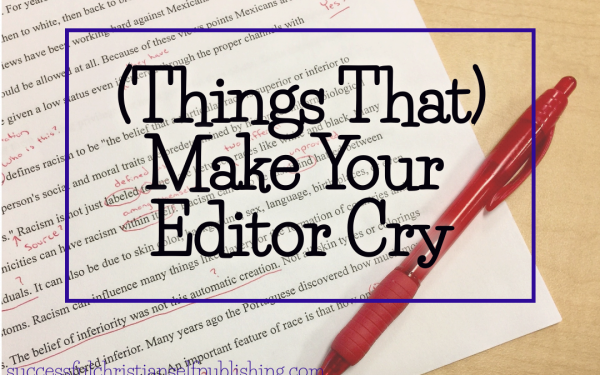Make Your Editor Cry: A Singular or Plural for Nouns Ending in S

Some English nouns end with either “-es” or “-s” which can pose a problem when differentiating the singular, plural, or possessive forms. Most don’t pose any problem. Would you ever say “the kiss were beautiful” instead of “the kiss was beautiful” or “the kisses were beautiful” for instance? But, there are a few that can cause confusion.
Bellows
Nothing to do with the verb about yelling, the noun “bellows” is an instrument used for moving air rapidly, as in to stoke the coals of a forge. It ends in “-s” and both the singular and plural of “bellows” is “bellows”, so you have to use a singular verb when speaking about one bellows and a plural verb when speaking about more than one.
Example:
His job is to operate the bellows (singular) for the blacksmith.
The three automatic bellows (plural) stoked all three forges.
Biceps
A “biceps” is a single muscle with two attaching tendons at one end. The word comes from Latin bicipit meaning two-headed, where bi– means two and –capit means head. The singular of “biceps” is “biceps.” The plural of “biceps” is also “biceps.” It is not a possessive biceps’ nor is it bicepses though Webster allows for the latter. You will never find the word bicepses in any professional literature so you probably shouldn’t use it either.
Although “bicep” without the “-s” is often incorrectly and ignorantly used in casual speech, that spelling should only ever be used to refer to a single branch of either the biceps brachii or the biceps femoris. Either major structure when discussed in the whole is a singular “biceps” (or maybe like a plural pair of “biceps”).
Examples:
He showed off the bulging biceps (singular) on his right arm.
Both your biceps (plural) will develop quickly with this exercise.
Mathematics
Generally speaking, “mathematics” is the science of numbers and their operations. It is plural in form but usually singular in construction. Though US English speakers shorten the word to “math,” the word “mathematic,” is a less common variant of “mathematical,” not “mathematics,” which probably explains why British English speakers typically shorten the word to “maths”.
Whether speaking in the singular or plural, use “mathematics.”
Means
Ends in “-s” and, like “series”, “means” is already both the singular and the plural form. Therefore, use a singular verb form if you speak about one particular series, and a plural verb form if you speak about several series at a time.
Example:
The track six train is (singular) a means of transportation, but there are (plural) several other good means of transportation right outside the station.
Medical
This can be really tricky. Diseases like diabetes, measles, mumps, rabies, rickets, and shingles are only in the singular. They are also uncountable. You cannot have “six measles” for example. Therefore, use a singular verb form as you would with any similar uncountable noun.
Correct:
Doctors warned that [diabetes / measles / mumps / rabies / rickets / shingles] is (singular) especially common among this demographic.
Incorrect:
Doctors warned that [diabetes / measles / mumps / rabies / rickets / shingles] are (plural) especially common among this demographic.
Apparel
Kind of the opposite of the medical related words above that each have only a singular form, there are some apparel related words–like jeans, tights, trousers, and pants–that only have a plural form.
All this hosiery is used only in the plural because they usually come in pairs—as in one “pant” for each leg = “pants”—and the singular forms have gone the way of the dodo long ago.
Correct:
Her new (jeans / tights / trousers / pants) are black.
She bought three pairs of (jeans / tights / trousers / pants).
Incorrect:
Her new (jeans / tights / trousers / pants) is black.
Tongs
NOTE: Not to be confused with “thongs”, the plural of a “thong,” which is a different thing entirely.
Kind of like the apparel examples above, when you think of salad “tongs” for example, at one time maybe they were a pair of singular “tong”? To grab something with the noun “tongs” is a verb meaning to “tong” it, but again if there ever were a corresponding singular noun for the actual object, it has long gone extinct. Anyway, “tongs” only have a plural form.
Correct:
These tongs are not big enough. None of these tongs are the right size.
Incorrect:
The tongs is not big enough.
Series
Ends in “-es” and the singular of “series” is “series”. The plural of “series” is also “series”. Therefore, use a singular verb form if you speak about one particular series, and a plural verb form if you speak about several series at a time.
Examples:
Dove Channel gave (singular) my favorite TV series the ax.
All the series on the Pureflix Network are (plural) really good.
Works (as in a factory, like a skunk works)
Another word that is plural in form but either singular or plural in construction is “works,” in the sense of a place where industrial labor is carried on like a plant or a factory.

Gregg Bridgeman is the Editor-in-Chief at Olivia Kimbrell Press. He is husband to best-selling Christian author Hallee Bridgeman and parent to three. He continues to proudly serve in the US Armed Forces and has done so in either an active or reserve capacity for more than twenty years as an airborne and air assault qualified paratrooper, earning a Bronze Star for his service. Most importantly, he was ordained in October of 2001 after surrendering his life to Christ decades earlier.

